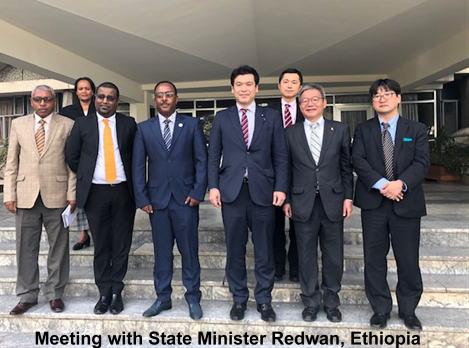From February 1 to 8, 2020, Mr. Matsumoto Yohei, State Minister of Economy, Trade and Industry, visited the Republic of South Africa, the Republic of Kenya, the Republic of Djibouti and the Federal Democratic Republic of Ethiopia.
In South Africa, State Minister Matsumoto attended Mining Indaba 2020, an annual conference on mining investment in Africa, delivered a keynote speech at a separate seminar on promoting cooperation between Japan and African countries in the field of mining, and held bilateral meetings with some participating countries. Through these efforts, he encouraged African countries to cooperate in developing mineral resources, such as cobalt and tantalum, and to improve investment environments.
In Kenya, Djibouti and Ethiopia, he exchanged views individually with the ministers responsible for economy and other officials. These ministers expressed their hopes for increased business development by Japanese companies in Africa and for further enhanced bilateral ties.
South Africa
(1) Participating in the Mining Indaba 2020 conference:
State Minister Matsumoto participated in Mining Indaba 2020 held in Cape Town, South Africa, a global leading conference in the field of mining investment, bringing together government officials, investors, representatives of resource-related companies and other participants from Europe, America, Asia and resource-rich African countries, and he committed to further enhancement of the relationship between Japan and resource-rich African countries in the field of mining.
Specifically, he delivered a keynote speech at a seminar organized by the Japan Oil, Gas and Metals National Corporation (JOGMEC), held meetings individually with ministers and officials in countries with which Japan has relationships in the field of resources, including South Africa, the Democratic Republic of the Congo (DRC) and the Republic of Rwanda, and endeavored to strengthen cooperative ties in the field of mining. The following is an outline of the outcomes:
*Note: The term “indaba” is a Zulu word meaning a meeting in which important issues should be discussed. This was the 26th conference.
(2) Outline of the keynote speech at the JOGMEC seminar
At the seminar, State Minister Matsumoto delivered a speech on Japan’s intention to contribute to the Sustainable Development Goals (SDGs) through Japan’s further dissemination of electrified vehicles and IoT into society, and stated Japan’s interest in cobalt, tantalum and other mineral resources necessary for such vehicles and technologies, much of which are accessible in Africa. In addition, he pointed out Japanese companies’ efforts for securing stable supplies of minerals and the potential in mineral resources in Africa, and he stated Japan’s intention to contribute to sustainable development of the mining resources in Africa by establishing a win-win relationship between Japan and Africa.
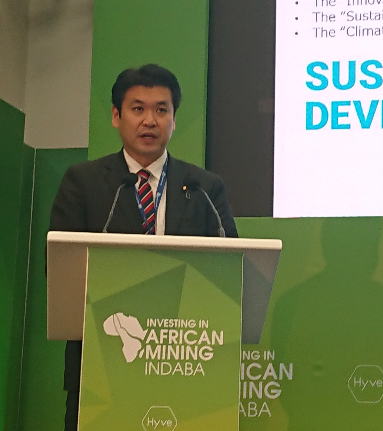
(3) Meetings with H.E. Mr. Samson Gwede Mantashe, Minister of Mineral and Energy Resources, and H.E. Ms. Nomalungelo Gina, Deputy Minister of Trade Industry and Economic Development, South Africa.
At the meeting with Minister Mantashe, Minister Mantashe expressed his hopes for Japan’s further investment in the field of metal mining, its clean coal technologies for decarbonization of coal fired power plants in South Africa, and other Japanese environmental technologies.
In response, State Minister Matsumoto stated Japan’s intention to enrich the Japan-South Africa relationship to achieve sustainable development in South Africa, while mentioning Japanese companies’ efforts in the field of metal mining, the clean coal technologies owned by Japan and Japan’s other strengths. In addition, he pointed out the importance of improving investment environments in resource-rich countries such as South Africa.
In the meeting that State Minister Matsumoto held with Deputy Minister Gina, he proposed that South Africa undertake efforts to enhance the economic environments between Japan and South Africa, including improving the business environments in the country, as follow-ups to the discussions at the Seventh Tokyo International Conference on African Development (TICAD7) held in August 2019.
The South African side replied that the country wishes to further enrich collaboration toward the realization of the proposal
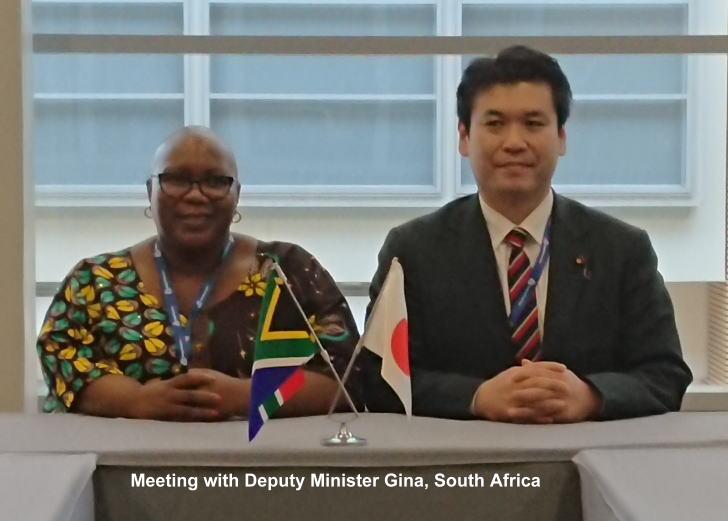
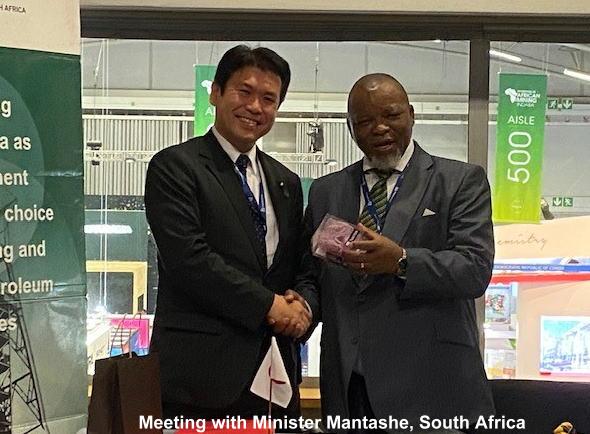
(4) Meeting with H.E. Mr. Sylvestre Ilunga Ilunkamba, Prime Minister, and H.E. Mr. Willy Kitobo Samsoni, Minister of Mines, DRC
At the meeting with Prime Minister Ilunga and Minister Kitobo, State Minister Matsumoto mentioned the further enriched cooperative ties between Japan and the DRC, a country advancing reforms, while Prime Minister Ilunga stated that the country has highly appraised Japan’s past investment and that it will proactively cooperate with Japan in the future. State Minister Matsumoto was the first Japanese official responsible for political affairs in Japan to have held a meeting with Prime Minister Ilunga since Prime Minister Ilunga took office.

(5) Meeting with H.E. Mr. Francis Gatare, Chief Executive Officer, Rwanda Mines, Petroleum and Gas Board (RMB), Rwanda
At the meeting with CEO Gatare, RMB, State Minister Matsumoto stated Japan’s interest in developing tantalum, which is highly accessible in Rwanda, while CEO Gatare expressed his hopes for Japan’s investment and engagement in mining in Rwanda in terms of funding, technologies, equipment and other issues.
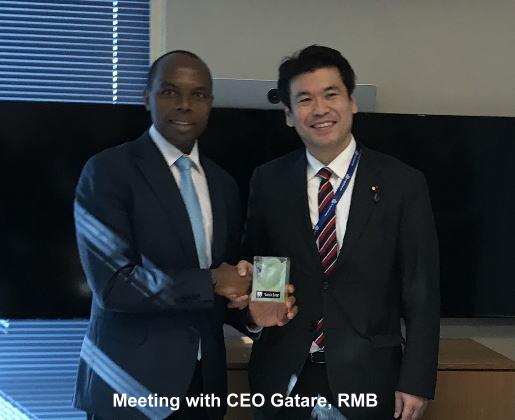
(6) Meeting with H.E. Mr. Tom Butler, Chief Executive Officer, International Council on Mining and Metals (ICMM)
At the meeting with CEO Butler, ICMM, State Minister Matsumoto provided information on the current situations of the systems under the Mine Safety Act and control systems for suspended and abandoned mines in Japan, which are relevant to ICMM’s formulation of standards for managing tailings dams in the private sector, an effort which was triggered by the disaster that occurred at the tailings dam in Brazil in February 2019. Following this, the two sides exchanged views.
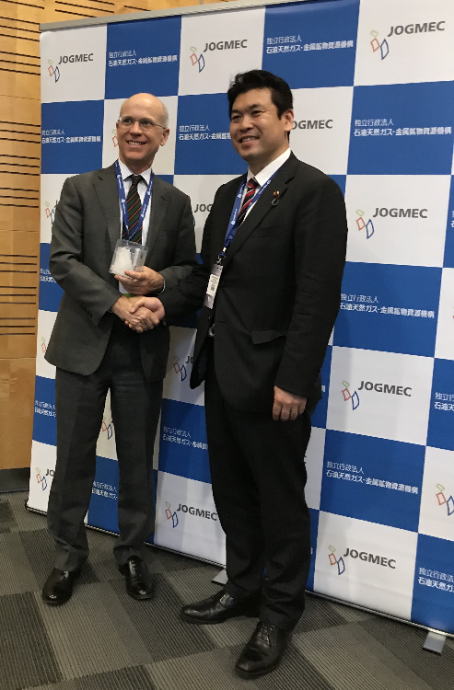
2. Kenya, Djibouti and Ethiopia
(1) Meetings with H.E. Mr. Macharia Kamau, Principal Secretary for Foreign Affairs, and H.E. Mr. Peter Munya, Cabinet Secretary for Ministry of Industry, Trade and Cooperatives, Kenya
On February 5, 2020, State Minister Matsumoto held individual meetings with both Principal Secretary Kamau and Cabinet Secretary Munya. At the beginning of the respective meetings, he expressed his condolences on the passing of the former President Moi on February 4, 2020. Moreover, he explained the convening of a business networking forum to advance exchanges between Japanese and Kenyan companies and cooperation for enhancing measures against counterfeit products in the country. He also requested that Kenya further improve business environments.
The Kenyan side replied that the country will promote bilateral cooperation, including enhancing measures against counterfeit products.
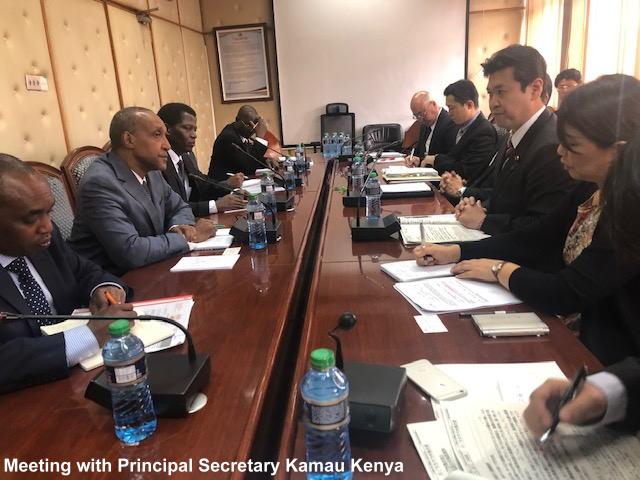
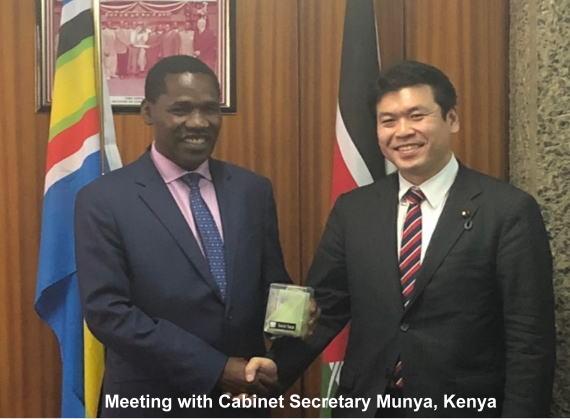
(2) Meetings with H.E. Mr. Waiss, Director General of the President’s Office, and H.E. Mr. Hassan, Minister of Commerce, H.E. Mr. Ilyas Moussa Dawalehm, Minister of Economy and Finance, and H.E. Mr. Mohamed Ali Hassan, Secretary General, Ministry of Foreign Affairs and International Cooperation, Djibouti
On February 6, 2020, State Minister Matsumoto held individual meetings with Director General Waiss, Minister Hassan, Minister Ilyas and Secretary General Ali Hassan. At the respective meetings, he explained JETRO’s support measures and efforts for encouraging Japanese companies to develop businesses in Africa.
The Djiboutian representatives praised the harmonious Japan-Djibouti relationship and expressed gratitude for Japan’s cooperation with the country.
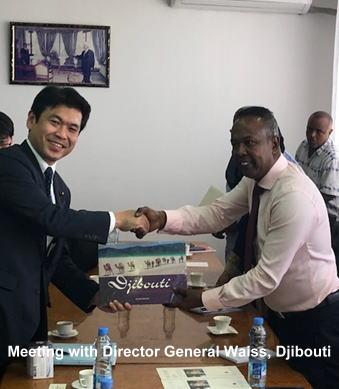
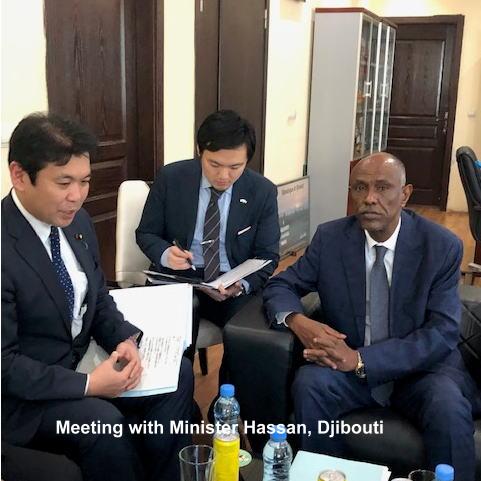

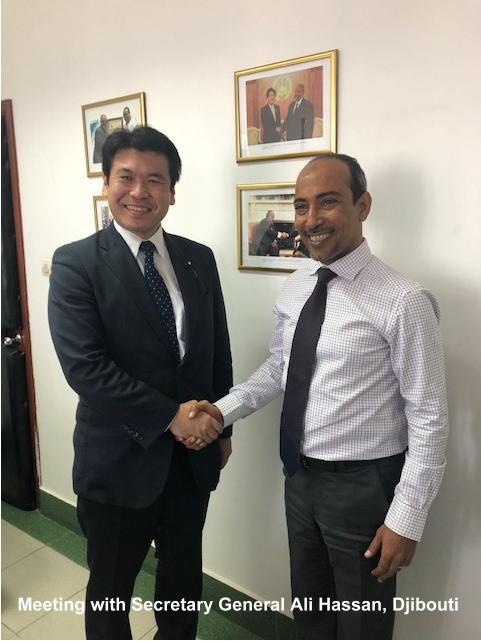
(3) Meeting with H.E. Mr. Redwan Hussien, State Minister of Foreign Affairs, Ethiopia
On February 7, 2020, State Minister Matsumoto held a meeting with State Minister Redwan. He praised a variety of Ethiopia’s efforts which have been progressing, led by Prime Minister Abiy, and explained the progress in business development made by Japanese companies in Ethiopia. In addition, he requested that Ethiopia improve business environments, including the issue of the lack of foreign currency reserves.
The Ethiopian side expressed gratitude for Japan’s past cooperation, and the two sides agreed to continue to hold discussions to promote their bilateral relationship.
